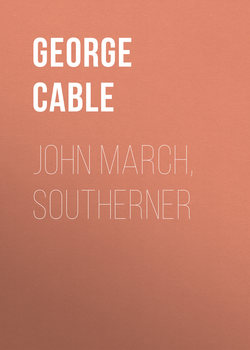Читать книгу John March, Southerner - Cable George Washington - Страница 15
XV.
ARRIVALS AT ROSEMONT
ОглавлениеThe air was mild down on the main road which, because it led from Suez to Pulaski City, was known as the Susie and Pussie pike. The highway showed a mere dusting of snow, and out afield the sun had said good-morning so cavalierly to some corn-shocks that the powder was wholly kissed off one sallow cheek of each. The riders kept the pike northwesterly a short way and then took the left, saying less and less as they went on, till the college came into view, their hearts sinking as it rose.
The campus was destitute of human sounds; but birds gossiped so openly on every hand concerning the tardy intrusion that John was embarrassed, and hardly felt, much less saw, what rich disorder the red and yellow browns of clinging and falling leaves made among the purple-gray trunks and olive-dappled boughs, and on the fading green of the sod.
The jays were everywhere, foppish, flippant, the perfection of privileged rudeness.
It seemed a great way through the grove. At the foot of the steps John would have liked to make the acquaintance of some fat hens that were picking around in the weak sunshine and uttering now and then a pious housewifely sigh.
There was an awful stillness as the two ascended the steps, carrying the broken carpet-bag between them. Glancing back down the campus avenue, John hoped the unknown woman just entering its far gate was not observing. So mild was the air here that the front door stood open. In the hall a tall student, with a sergeant's chevrons on his gray sleeve, came from a class-room and led them into a small parlor. Major Garnet was in Suez, but Mrs. Garnet would see them.
They waited. On the mantel an extremely Egyptian clock – green and gilt – whispered at its task in servile oblivion to visitors. John stared at a black-framed lithograph, and his father murmured,
"That's the poet Longfellow, son, who wrote that nice letteh to yo' dear motheh. This colo'ed picture's Napoleon crossing the Alps."
A footstep came down the hall, and John saw a pretty damsel of twelve or thirteen with much loose red-brown hair, stop near the door of the reception-room and gaze at someone else who must have been coming up the porch steps. He could not hear this person's slow advance, but presently a voice in the porch said, tenderly, "Miss Barb?" and gave a low nervous laugh.
Barbara shrank back a step. The soft footfall reached the threshold. The maiden retreated half a step more. Behind her sounded a faint patter of crinoline coming down the hall stairs. And then there came into view from the porch, bending forward with caressing arms, a slim, lithe negress of about nineteen years. Her flimsy dress was torn by thorns, and her hands were pitifully scratched. Her skirt was gone, the petticoat bemired, and her naked feet were bleeding.
"Miss Barb," said the tender voice again. From the inner stairs a lady appeared.
"What is it, son?" Judge March asked, and rising, saw the lady draw near the girl with a look of pitying uncertainty. The tattered form stood trembling, with tears starting down her cheeks.
"Miss Rose – Oh, Miss Rose, it's me!"
"Why, Johanna, my poor child!" Two kind arms opened and the mass of rags and mud dashed into them. The girl showered her kisses upon the pure garments, and the lady silently, tenderly, held her fast. Then she took the black forehead between her hands.
"Child, what does this mean?"
"Oh, it means nothin' but C'nelius, Miss Rose – same old C'nelius! I hadn't nowhere to run but to you, an' no chance to come but night."
"Can you go upstairs and wait a moment for me in my room? No, poor child, I don't think you can!" But Johanna went, half laughing, half crying, and beckoning to Barbara in the old-time wheedling way.
"Go, Barbara."
The child followed, while John and his father stood with captive hearts before her whom the youths of the college loved to call in valedictory addresses the Rose of Rosemont. She spent a few moments with them, holding John's more than willing hand, and then called in the principal's first assistant, Mr. Dinwiddie Pettigrew, a smallish man of forty, in piratical white duck trousers, kid slippers, nankeen sack, and ruffled shirt. Irritability confessed itself in this gentleman's face, which was of a clay color, with white spots. Mr. Pettigrew presently declared himself a Virginian, adding, with the dignity of a fallen king, that he – or his father, at least – had lost over a hundred slaves by the war. It was their all. But the boy could not shut his ear to the sweet voice of Mrs. Garnet as, at one side, she talked to his father.
"Sir?" he responded to the first assistant, who was telling him he ought to spell March with a final e, it being always so spelled – in Virginia. The Judge turned for a lengthy good-by, and at its close John went with his preceptor to the school-room, trying, quite in vain, to conceive how Mr. Pettigrew had looked when he was a boy.
